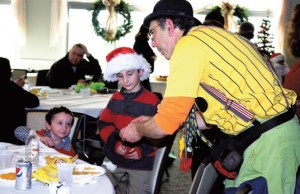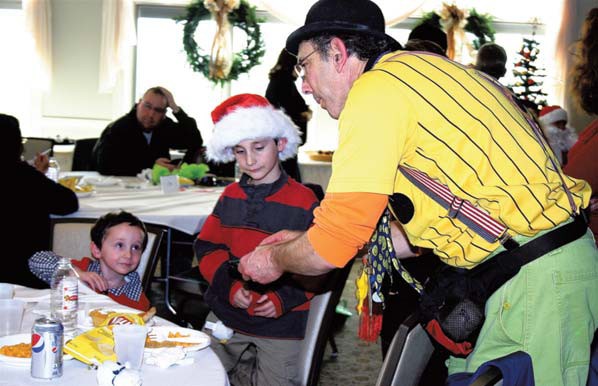 TZEDAKAH BOX
TZEDAKAH BOX
By Len Abram
Special to The Advocate
MILTON – Of the 613 commandments in Judaism, visiting the sick ranks high. The original bikkur cholim, so says Jewish tradition, occurs in Genesis. God, not an emissary, visits Abraham as the patriarch is recovering from the bris, his circumcision as an adult. Visiting the sick emulates the divine. Because illness can depress the sick, the rabbis of the Talmud also encouraged visits to bring cheer. They recognized that improving patients’ mental state, their spirit, helps them recover.
Twice a month, Juggles the clown navigates through Boston traffic as he heads to a local hospital, such as Boston Medical Center, to cheer up sick children. He is wearing a smiley face tie, baggy lime-green trousers, red suspenders, rouged nose, lemon-yellow shirt and black bowler hat. Juggles belongs to the Hearts & Noses troupe, a group of 20 clowns, which visits local hospitals to entertain kids and sometimes their parents, too.
Juggles’ nickname derives from his skillful juggling. At a Celtics fundraiser for sick kids, Juggles taught a point guard how to put two balls in the air without dropping any. Agile hands also pay dividends in magic tricks. Juggles makes coins and cards disappear and reappear to the delight of his audience of children, many of whom go through surgeries and other therapies, often painful, scary, far from the familiar, and home.
Most other days, Juggles is real estate developer and manager Peter Schwarz, who lives in Milton with his wife and twin boys. The boys are preparing for their own mitzvah: a bar mitzvah at Temple Beth Shalom.
Schwarz manages a 100,000- square-foot building in Haverhill, among other properties. In a way, clowning and business share a common goal: bringing or encouraging happiness in others.
Schwarz measures success in real estate by filling his buildings with satisfied tenants and long leases. Clowns measure success by turning a child’s (or parents’) frowns and concerns into smiles and laughter. Schwarz remembers exiting Mass General with another clown – clowns often operate in pairs – and having parents, whose child they just entertained, run to thank them.
“Our clowning brought smiles to their child for the first time since entering the hospital,” he says.
Jeannie Lindheim founded the Hearts & Noses Hospital Clown Troupe in 1997. A local actress and educator, Lindheim traveled to Russia with physician-clown “Patch” Adams. (Robin Williams starred in a movie based upon Adams’ life). She decided to bring back to Boston lessons she observed about clowns helping sick children and began to train clowns to visit hospitals and shelters.
Thirteen years ago, Schwarz read an article about the troupe and joined. After extensive training with Lindheim, he started going to local hospitals.
“My parents and their families enjoyed the rich tradition of Jews in vaudeville,” he says. “My mother’s father Sam, his son Len and my father Irving – they were all really funny, told jokes and amused their family and friends. I added juggling to the humor.”
A longtime volunteer, Schwarz head previously handled calls at Samaritans, the suicide prevention center, counseling the distraught and depressed. The idea of entertaining children appealed to him around the same time he became a parent himself.
Clowning in hospitals goes beyond entertainment and distraction to be an integral part of healing. In one instance, a surgeon at a local hospital asked the clown to come into the post-operation area. A four-year old girl was unhappy after she awoke. Even ice cream did not help. The clown from the troupe arrived and asked about her dolls. They played. When she was back to giggling, the surgeon returned to his patient with thanks.
Israel is also active in hospital clowning, and an innovator. In 2011, Israel hosted conference in Jerusalem with 200 medical clowns from as far away as Australia. They learned about Dream Doctors, Israel’s professional training in the discipline of medical clowning. Haifa University offers a degree in medical clowning, as an important member of the medical team. Research indicates “treating” patients with humor and joy improves chances for cure and recovery. Even adults, such as those undergoing in vitro fertilization, do better, they say, with clowning.
“Humor is so therapeutic,” Schwarz says. “Once, a nurse asked if we could encourage a five-year-old to walk for five minutes when receiving a bronchial treatment. We walked in front blowing bubbles while the patient followed breaking bubbles we blew along the way.”
Schwarz is happiest providing kids with play, in which the giver also gets he says. “My patients have touched me with their resilience, their generous spirit, their good fight.”






